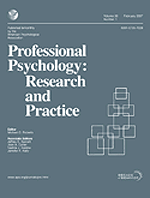 | |
| Discipline | Psychology |
|---|---|
| Language | English |
| Edited by | Ronald T. Brown |
| Publication details | |
| Former name(s) | Professional Psychology |
| History | 1970–present |
| Publisher | American Psychological Association (United States) |
| Frequency | Bimonthly |
| Impact factor | 1.716 (2020) |
| Standard abbreviations ISO 4 (alt) · Bluebook (alt) NLM (alt) · MathSciNet (alt | |
| ISO 4 | Prof. Psychol.: Res. Pract. |
| NLM | Prof Psychol Res Pr |
| Indexing CODEN (alt · alt2) · JSTOR (alt) · LCCN (alt) MIAR · NLM (alt) · Scopus | |
| ISSN | 0735-7028 (print) 1939-1323 (web) |
| Links | |
The Professional Psychology: Research and Practice is a peer-reviewed, English language journal published six times per year by the American Psychological Association (APA). The journal "publishes conceptual and data-based articles on the issues and methods involved in the practice of psychology. Topics encompass a broad range, including health psychology, community psychology, family psychology, forensic psychology, and clinical neuropsychology". The editor-in-chief is Ronald T. Brown (University of North Texas at Dallas).
First published in 1970, as Professional Psychology, the name of the journal was extended to Professional Psychology: Research and Practice in 1983.
The journal has implemented the Transparency and Openness Promotion (TOP) Guidelines. The TOP Guidelines provide structure to research planning and reporting and aim to make research more transparent, accessible, and reproducible.
Abstracting and indexing
According to the Journal Citation Reports, the journal has a 2020 impact factor of 1.716.
References
- Journal description (Feb. 2, 2009) http://www.apa.org/pubs/journals/pro/
- "Transparency and Openness Promotion". APA.org. American Psychological Association. Retrieved 2021-09-30.
- "What are the TOP Guidelines and why are they important?". APA.org. American Psychological Association. Retrieved 2021-09-30.
- "Professional Psychology: Research and Practice". 2021 Journal Citation Reports. Web of Science (Social Sciences ed.). Clarivate Analytics. 2021.
This article about an academic journal on psychology is a stub. You can help Misplaced Pages by expanding it. See tips for writing articles about academic journals. Further suggestions might be found on the article's talk page. |